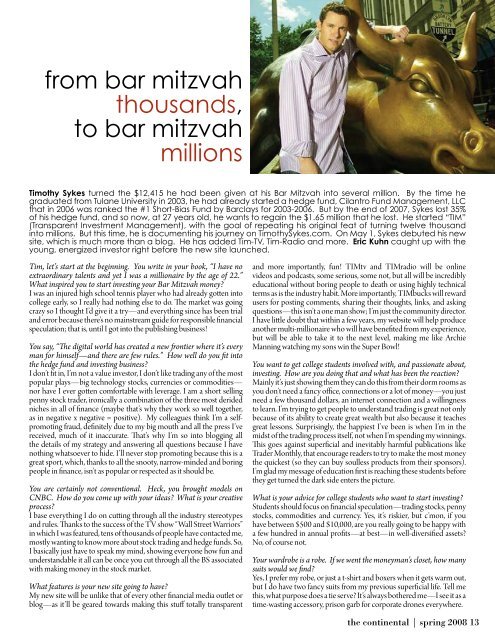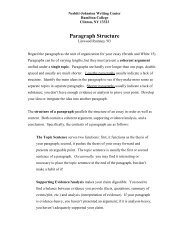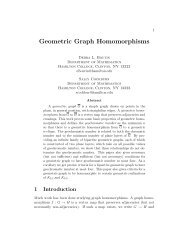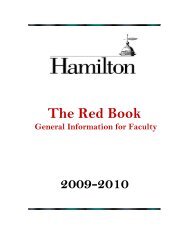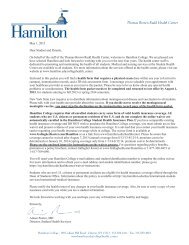The Continental - Hamilton College
The Continental - Hamilton College
The Continental - Hamilton College
You also want an ePaper? Increase the reach of your titles
YUMPU automatically turns print PDFs into web optimized ePapers that Google loves.
from bar mitzvahthousands,to bar mitzvahmillionsTimothy Sykes turned the $12,415 he had been given at his Bar Mitzvah into several million. By the time hegraduated from Tulane University in 2003, he had already started a hedge fund, Cilantro Fund Management, LLCthat in 2006 was ranked the #1 Short-Bias Fund by Barclays for 2003-2006. But by the end of 2007, Sykes lost 35%of his hedge fund, and so now, at 27 years old, he wants to regain the $1.65 million that he lost. He started “TIM”(Transparent Investment Management), with the goal of repeating his original feat of turning twelve thousandinto millions. But this time, he is documenting his journey on TimothySykes.com. On May 1, Sykes debuted his newsite, which is much more than a blog. He has added Tim-TV, Tim-Radio and more. Eric Kuhn caught up with theyoung, energized investor right before the new site launched.Tim, let’s start at the beginning. You write in your book, “I have noextraordinary talents and yet I was a millionaire by the age of 22.”What inspired you to start investing your Bar Mitzvah money?I was an injured high school tennis player who had already gotten intocollege early, so I really had nothing else to do. <strong>The</strong> market was goingcrazy so I thought I’d give it a try—and everything since has been trialand error because there’s no mainstream guide for responsible financialspeculation; that is, until I got into the publishing business!You say, “<strong>The</strong> digital world has created a new frontier where it’s everyman for himself—and there are few rules.” How well do you fit intothe hedge fund and investing business?I don’t fit in, I’m not a value investor, I don’t like trading any of the mostpopular plays—big technology stocks, currencies or commodities—nor have I ever gotten comfortable with leverage. I am a short sellingpenny stock trader, ironically a combination of the three most deridedniches in all of finance (maybe that’s why they work so well together,as in negative x negative = positive). My colleagues think I’m a selfpromotingfraud, definitely due to my big mouth and all the press I’vereceived, much of it inaccurate. That’s why I’m so into blogging allthe details of my strategy and answering all questions because I havenothing whatsoever to hide. I’ll never stop promoting because this is agreat sport, which, thanks to all the snooty, narrow-minded and boringpeople in finance, isn’t as popular or respected as it should be.You are certainly not conventional. Heck, you brought models onCNBC. How do you come up with your ideas? What is your creativeprocess?I base everything I do on cutting through all the industry stereotypesand rules. Thanks to the success of the TV show “Wall Street Warriors”in which I was featured, tens of thousands of people have contacted me,mostly wanting to know more about stock trading and hedge funds. So,I basically just have to speak my mind, showing everyone how fun andunderstandable it all can be once you cut through all the BS associatedwith making money in the stock market.What features is your new site going to have?My new site will be unlike that of every other financial media outlet orblog—as it’ll be geared towards making this stuff totally transparentand more importantly, fun! TIMtv and TIMradio will be onlinevideos and podcasts, some serious, some not, but all will be incrediblyeducational without boring people to death or using highly technicalterms as is the industry habit. More importantly, TIMbucks will rewardusers for posting comments, sharing their thoughts, links, and askingquestions—this isn’t a one man show; I’m just the community director.I have little doubt that within a few years, my website will help produceanother multi-millionaire who will have benefited from my experience,but will be able to take it to the next level, making me like ArchieManning watching my sons win the Super Bowl!You want to get college students involved with, and passionate about,investing. How are you doing that and what has been the reaction?Mainly it’s just showing them they can do this from their dorm rooms asyou don’t need a fancy office, connections or a lot of money—you justneed a few thousand dollars, an internet connection and a willingnessto learn. I’m trying to get people to understand trading is great not onlybecause of its ability to create great wealth but also because it teachesgreat lessons. Surprisingly, the happiest I’ve been is when I’m in themidst of the trading process itself, not when I’m spending my winnings.This goes against superficial and inevitably harmful publications likeTrader Monthly, that encourage readers to try to make the most moneythe quickest (so they can buy soulless products from their sponsors).I’m glad my message of education first is reaching these students beforethey get turned the dark side enters the picture.What is your advice for college students who want to start investing?Students should focus on financial speculation—trading stocks, pennystocks, commodities and currency. Yes, it’s riskier, but c’mon, if youhave between $500 and $10,000, are you really going to be happy witha few hundred in annual profits—at best—in well-diversified assets?No, of course not.Your wardrobe is a robe. If we went the moneyman’s closet, how manysuits would we find?Yes, I prefer my robe, or just a t-shirt and boxers when it gets warm out,but I do have two fancy suits from my previous superficial life. Tell methis, what purpose does a tie serve? It’s always bothered me—I see it as atime-wasting accessory, prison garb for corporate drones everywhere.the continental | spring 2008 13


